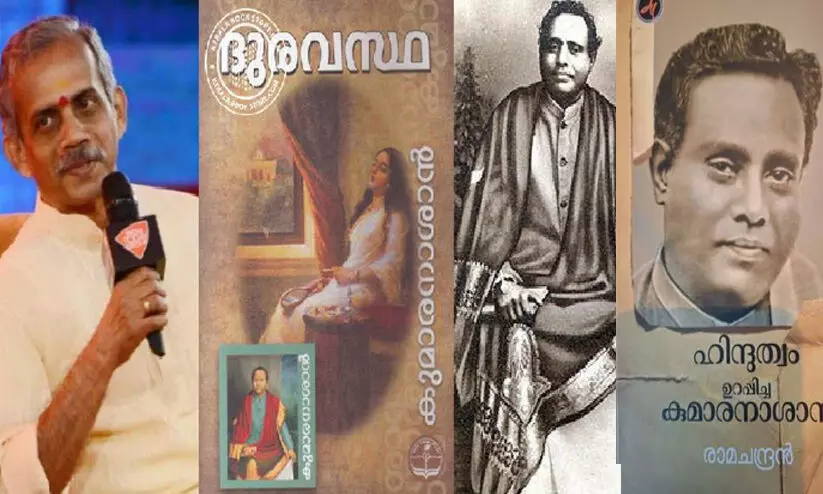
Muslims killed Asan: Sangh hijacking Kumaran Asan through ‘Duravastha’
text_fieldsThe Hindutva groups in Kerala have always tried to connect poet Kumaran Asan to their ideology by portraying him as an early Hindutva missionary in the state, citing his poem ‘Duravastha,’ a long anti-caste work set against the backdrop of the 1921 Mappila Rebellion.
The poem narrates the story of a Brahmin woman named Savithri who finds refuge with a Dalit man during the riots.
A century later, Asan's work and legacy have been co-opted and distorted by Hindutva activists, claiming his writings support their ideology, with a new claim that he was killed due to an alleged plot by ‘Muslim terrorists,’ a report by The News Minute said, quoting from "Hinduthwam Urappicha Kumaranasan," authored by Ramachandran.
Kumaran Asan, born into the lowered Ezhava caste, dedicated his life to combating the caste system. His commitment to social reform earned him a revered place alongside other Malayalam literary giants, Vallathol Narayana Menon and Ulloor S Parameswara Iyer, forming the 'modern triumvirate' of Malayalam poetry.
Asan's grandson, P Vijaya Kumar, a retired English professor, denounces the recent propaganda as a “toxic and vicious” distortion of Asan's true beliefs.
Responding to these new narratives about Asan by the Hindutva groups with nefarious intentions, Asan's grandson, P Vijaya Kumar, a retired English professor, was quoted by TNN, calling it “a propaganda as a ‘toxic and vicious’ distortion of Asan's true beliefs.”
This narrative that Muslims killed Asan first appeared in the BJP's mouthpiece Janmabhumi and later in the book "Hinduthwam Urappicha Kumaranasan," which suggests Asan was targeted for his supposed Hindu missionary activities.
In reality, Asan drowned when his boat capsized in River Pallana in 1924. Vijaya Kumar emphasizes that these unfounded theories lack academic support but continue to mislead the public, especially the youth.
Duravastha, published against the tumultuous backdrop of the Mappila Rebellion, faced criticism from some Muslim community members at the time. Asan addressed their concerns, demonstrating his commitment to social harmony and understanding.
However, in recent years, Sangh Parivar activists have reprinted the poem, misrepresenting it as a testament to Hindu suffering during the rebellion. They even claimed that it echoed the thoughts of Sree Narayana Guru, a prominent social reformer and Asan’s mentor, known for his inclusive vision encapsulated in the phrase, “one caste, one religion, one god for all human beings.”
Vijaya Kumar asserts that these misinterpretations are part of a broader agenda to reshape Asan’s legacy to fit contemporary political narratives. “This is the attempt by a set of partisans to hijack Asan’s life and work to push through an agenda shaped by the compulsions of contemporary politics,” he says.
Asan, along with Sree Narayana Guru and Dr. Palpu, worked tirelessly for the upliftment of oppressed castes, drawing inspiration from figures like Booker T. Washington and advocating for education and self-help.
Kumaran Asan's life was marked by a relentless pursuit of education despite systemic barriers. Denied access to advanced schooling in his hometown, he studied under local scholars and later moved to Bangalore and Calcutta to further his education. His works, such as "Chandalabhikshuki," vividly critique the caste system, portraying the struggles of lower-caste individuals in seeking equality.
Asan's grandson highlights the poet’s diverse roles beyond his literary contributions. Asan was a savvy businessman, running a tile factory in Aluva, and an influential figure in social organizations like the Sree Narayana Paripalana Dharma Paripalana Yogam (SNDP). He also founded and edited the literary journal Vivekodayam and organized Kerala’s first industrial exhibition in 1905.





















